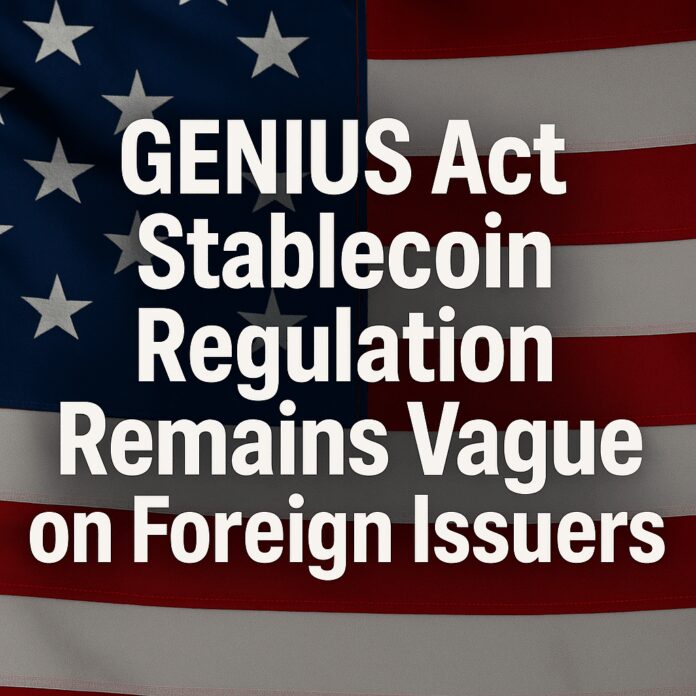The GENIUS Act — hailed by some as a step toward regulatory clarity for digital assets in the U.S. — may not be as sharp as its name suggests. While it signals that Congress is finally paying attention to blockchain innovation, its guidance on stablecoins, particularly those issued outside the United States, remains unclear and incomplete.
At the heart of the issue: Can foreign-based stablecoins like USDT or EURC operate in the U.S. under this law — and if so, under what terms?
What the GENIUS Act Actually Does
The GENIUS Act (Government Evaluation of New Innovations and Using Science) is not a comprehensive regulatory overhaul. Rather, it’s a mandate for federal agencies to assess how emerging technologies — including blockchain — could improve public sector operations.
In doing so, it lays the groundwork for potential stablecoin guidelines. But the text:
- Fails to distinguish between domestic and foreign issuers
- Does not specify how cross-border stablecoins will be treated under U.S. law
- Leaves open questions about registration, reserves, redemption mechanisms, and compliance frameworks
Why Foreign Stablecoin Issuers Should Care
The U.S. is a critical market for nearly all major stablecoin providers — including those based overseas, such as:
- Tether (USDT) – incorporated in Hong Kong and the BVI
- EURC – issued by Circle but governed under non-U.S. entities
- TrustToken (TrueUSD) – with operations spanning Asia and offshore jurisdictions
If the GENIUS Act is later interpreted to require U.S.-specific licensing or reserve controls, it could force foreign issuers to either comply, exit, or restructure.
Industry Concern Is Growing
Policy analysts and legal experts say the current language offers too much ambiguity to guide responsible innovation or cross-border compliance. Key concerns include:
- Lack of reciprocity: Will the U.S. accept regulatory standards from other G20 nations?
- No timeline for enforcement clarity: The Act starts a study, but offers no deadline for formal rulemaking.
- Fragmentation risk: Without clear federal rules, states may introduce conflicting stablecoin laws — again.
Meanwhile, lawmakers pushing for a “trusted, compliant stablecoin ecosystem” risk creating a playing field that only U.S. entities can enter, stifling international competitiveness.
What’s Next?
- The GENIUS Act is only the first step. Agencies like the SEC, CFTC, and Treasury must now translate it into action — ideally with stakeholder input.
- Foreign issuers should engage early with U.S. regulators, prepare for reserve audits and transparency requirements, and watch for calls for comment.
- The stablecoin market — already under scrutiny post-FTX — may see divergent treatment depending on geography, governance, and peg currency.
Final Take
The GENIUS Act may be a political win for digital asset advocates — but for foreign stablecoin issuers, it leaves more questions than answers.
If the U.S. wants to lead in digital finance, it must harmonize clarity with openness. Otherwise, global stablecoin innovation risks becoming a gated system — with Washington holding the keys.




